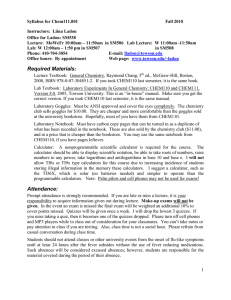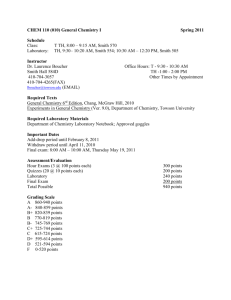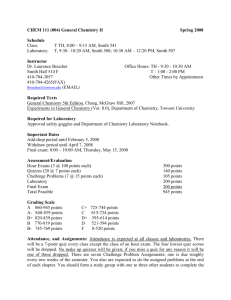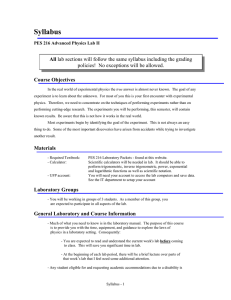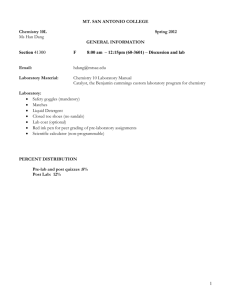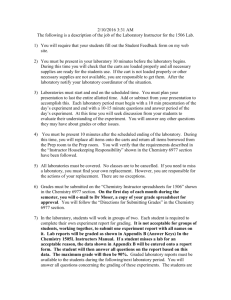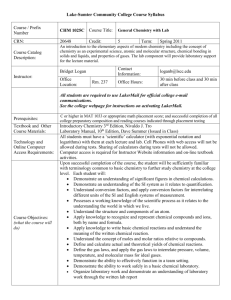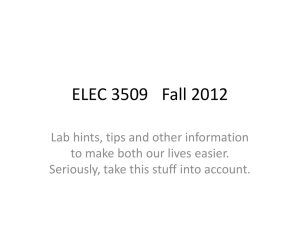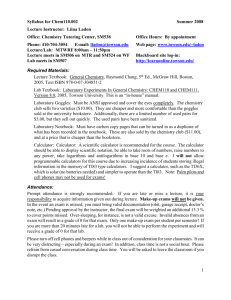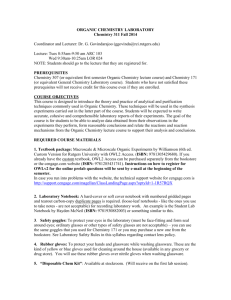Lab Reports - Towson University
advertisement
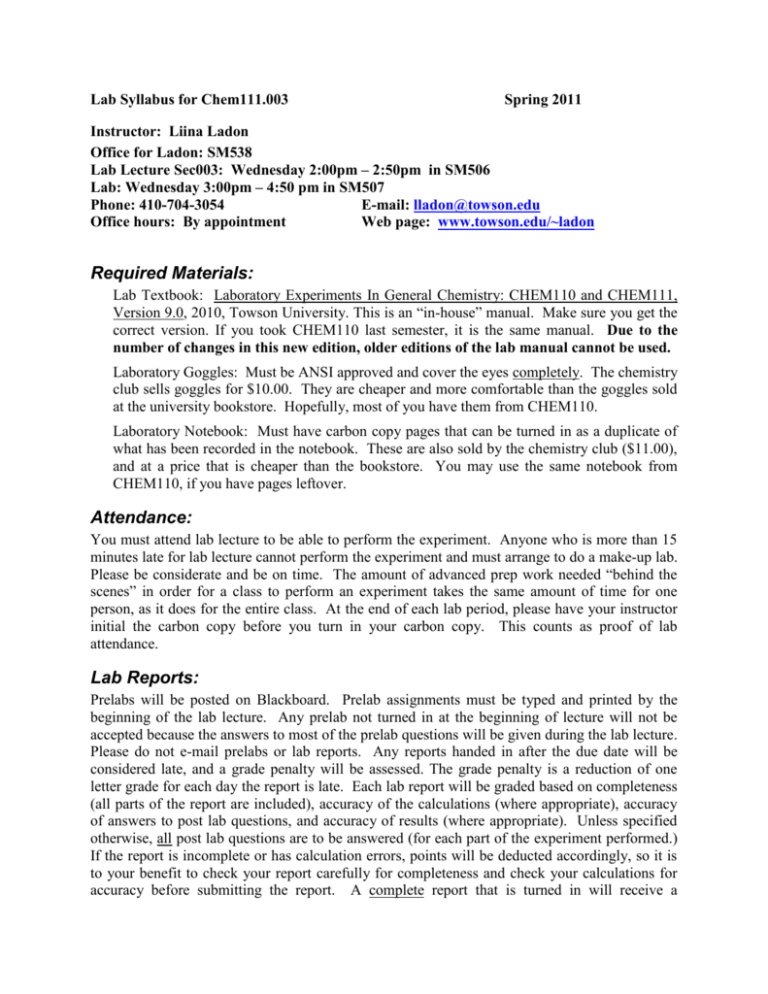
Lab Syllabus for Chem111.003 Spring 2011 Instructor: Liina Ladon Office for Ladon: SM538 Lab Lecture Sec003: Wednesday 2:00pm – 2:50pm in SM506 Lab: Wednesday 3:00pm – 4:50 pm in SM507 Phone: 410-704-3054 E-mail: lladon@towson.edu Office hours: By appointment Web page: www.towson.edu/~ladon Required Materials: Lab Textbook: Laboratory Experiments In General Chemistry: CHEM110 and CHEM111, Version 9.0, 2010, Towson University. This is an “in-house” manual. Make sure you get the correct version. If you took CHEM110 last semester, it is the same manual. Due to the number of changes in this new edition, older editions of the lab manual cannot be used. Laboratory Goggles: Must be ANSI approved and cover the eyes completely. The chemistry club sells goggles for $10.00. They are cheaper and more comfortable than the goggles sold at the university bookstore. Hopefully, most of you have them from CHEM110. Laboratory Notebook: Must have carbon copy pages that can be turned in as a duplicate of what has been recorded in the notebook. These are also sold by the chemistry club ($11.00), and at a price that is cheaper than the bookstore. You may use the same notebook from CHEM110, if you have pages leftover. Attendance: You must attend lab lecture to be able to perform the experiment. Anyone who is more than 15 minutes late for lab lecture cannot perform the experiment and must arrange to do a make-up lab. Please be considerate and be on time. The amount of advanced prep work needed “behind the scenes” in order for a class to perform an experiment takes the same amount of time for one person, as it does for the entire class. At the end of each lab period, please have your instructor initial the carbon copy before you turn in your carbon copy. This counts as proof of lab attendance. Lab Reports: Prelabs will be posted on Blackboard. Prelab assignments must be typed and printed by the beginning of the lab lecture. Any prelab not turned in at the beginning of lecture will not be accepted because the answers to most of the prelab questions will be given during the lab lecture. Please do not e-mail prelabs or lab reports. Any reports handed in after the due date will be considered late, and a grade penalty will be assessed. The grade penalty is a reduction of one letter grade for each day the report is late. Each lab report will be graded based on completeness (all parts of the report are included), accuracy of the calculations (where appropriate), accuracy of answers to post lab questions, and accuracy of results (where appropriate). Unless specified otherwise, all post lab questions are to be answered (for each part of the experiment performed.) If the report is incomplete or has calculation errors, points will be deducted accordingly, so it is to your benefit to check your report carefully for completeness and check your calculations for accuracy before submitting the report. A complete report that is turned in will receive a minimum grade of 70%. The minimum grade for an incomplete lab report will be 50%, as long your carbon copy is turned with the instructor’s initials. Please feel free to seek help in the tutoring center, should you need help with your reports. Reports must be prepared using a word processor, however, calculations may be hand written. Graphs should be prepared using CurveExpert or Excel. Other graphing programs may be used, but please show a sample graph to your lab instructor for their approval. Chemistry 111.003 Laboratory Schedule Spring 2011 Experiment Title Date Expt Lab Report Due 1/31 – 2/4 15A Introduction, Safety, Check-in Synthesis and Analysis of a Compound of Iron (SACI), Part A 15A 2/7 – 2/11 16 Intermolecular Forces Exercise 5 2/14 – 2/18 15B SACI, Iron Analysis, Part B Ex 16 2/21 – 2/25 17 Freezing Point of a Solution Ex 15B 2/28 – 3/4 17 Freezing Point of a Solution, cont’d. none 3/7 – 3/11 20 Chemical Kinetics: Reaction of Thiosulfate Ion with Hydrogen Ion Ex 17 3/14 – 3/18 15CD SACI, Water and Oxalate Analyses, Parts C & D Ex20 3/21 – 3/25 - No Lab – Spring Break -- 3/28 – 4/1 21 Chemical Equilibrium and LeChatelier’s Principle Ex 15C-G 4/4 – 4/8 22ABD Acids, Bases, Salts, and Buffers, Parts A, B, & D Ex 21 4/11 – 4/15 22CEF Acids, Bases, Salts, and Buffers, Parts C, E, & F Ex 22ABD 4/18 – 4/22 23 Introduction to Qualitative Analysis Ex 22CEF 4/25 – 4/29 24 Environmental Forensics Prelim 5/2 – 5/6 24 Environmental Forensics, cont’d. Intermediate 5/9 – 5/13 24 Environmental Forensics, cont’d. Check-out Presentation
